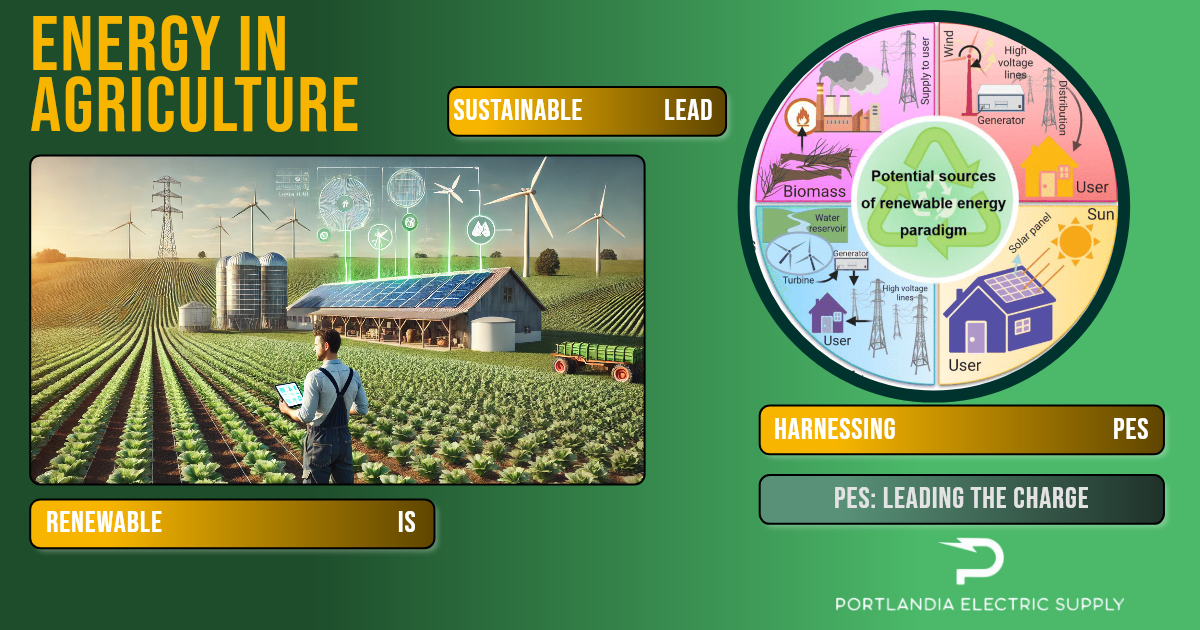Harnessing Renewable Energy in Agriculture: How PES is Leading the Charge for a Sustainable Future

In the continuously evolving realm of sustainable agriculture, the integration of renewable energy solutions is pivotal in steering the sector towards a greener future. At the helm of this transformation is Portlandia Electric Supply (PES), spearheading innovative initiatives like agrivoltaics and solar energy in agriculture to boost energy efficiency and reduce environmental impact. As the agricultural industry tackles the challenges of climate change and resource scarcity, PES’s dedication to a circular economy fosters agricultural innovations and sustainable farming practices. This post explores how PES empowers farmers and agricultural businesses with cutting-edge technologies and seamless supply chain solutions, establishing a new benchmark for sustainable growth. By equipping agricultural operations with necessary tools and resources for scalability and efficiency, PES not only meets immediate operational objectives but also lays the foundation for a resilient agricultural future.
Introduction to Renewable Energy in Agriculture
The agricultural sector is experiencing a significant shift towards sustainability, with renewable energy playing a critical role. This section delves into the fundamental concepts driving this transformation and introduces Portlandia Electric Supply (PES) as a leading innovator in the field.
The Role of Renewable Energy
Renewable energy is transforming agriculture by providing sustainable power solutions that lessen dependence on fossil fuels. This transition is essential for mitigating climate change and securing long-term food availability.
Research findings highlight that renewable energy sources like solar, wind, and biomass are being increasingly integrated into agricultural operations. These clean energy alternatives not only decrease carbon emissions but also present cost-effective solutions for farmers.
The adoption of renewable energy in agriculture extends beyond power generation. It includes innovative practices such as solar-powered irrigation systems and biomass-fueled greenhouse heating, showcasing the versatility of these technologies in meeting various agricultural needs.
Sustainability and Circular Economy
The concept of a circular economy is gaining traction in agriculture, emphasizing resource efficiency and waste reduction. This approach aligns seamlessly with the principles of sustainable farming and renewable energy integration.
In a circular agricultural model, waste products are transformed into valuable resources. For instance, crop residues can be converted into bioenergy, forming a closed-loop system that optimizes resource use and minimizes environmental impact.
Studies indicate that applying circular economy principles in agriculture can significantly cut greenhouse gas emissions and enhance soil health, further boosting the sector’s sustainability.
PES: A Leader in Innovation
Portlandia Electric Supply (PES) is at the forefront of innovation in the agricultural renewable energy sector. Their commitment to sustainable solutions is reshaping the industry landscape.
PES’s strategy merges cutting-edge technology with practical applications, providing farmers and agricultural businesses with bespoke renewable energy solutions. From advanced solar installations to smart energy management systems, PES is a leader in agricultural innovation.
By cultivating partnerships with research institutions and technology developers, PES continues to push the limits of what is achievable in sustainable agriculture, setting new standards for the industry.
PES Solutions for Sustainable Farming
PES offers a suite of innovative solutions designed to enhance sustainability in farming practices. This section examines specific technologies and approaches making a substantial impact in the agricultural sector.
Agrivoltaics for Energy Efficiency
Agrivoltaics, the integration of solar energy production with crop cultivation, is a pioneering approach promoted by PES. This innovative system maximizes land use efficiency while delivering dual benefits of energy generation and crop production.
In agrivoltaic systems, solar panels are positioned above crops, creating a synergistic relationship. The panels offer shade, reducing water evaporation and safeguarding plants from extreme weather, while the crops below help cool the panels, boosting their efficiency.
Research indicates that agrivoltaic systems can boost land productivity by up to 70%, providing a compelling solution for farmers seeking to diversify income streams and enhance sustainability.
Solar Energy in Agriculture
Solar energy has become a cornerstone of sustainable agriculture, with PES leading the charge in implementing advanced solar solutions tailored for farm operations. These systems range from small-scale installations for powering irrigation pumps to large arrays meeting the entire energy needs of a farm.
PES’s solar solutions are designed with scalability in mind, enabling farmers to start small and expand their renewable energy capacity as required. This flexibility ensures that farms of all sizes can benefit from solar technology.
Moreover, PES provides innovative financing options and expert guidance, making the transition to solar energy more attainable and less daunting for agricultural businesses.
Reducing Environmental Impact
PES’s renewable energy solutions play a significant role in reducing the environmental footprint of agricultural operations. By transitioning farms away from fossil fuels, these technologies are crucial in mitigating climate change and preserving ecosystems.
The implementation of renewable energy systems in agriculture leads to substantial reductions in greenhouse gas emissions. PES’s solutions have demonstrated reductions in carbon emissions by up to 50% in some farming operations.
Additionally, PES’s focus on energy efficiency and smart technology integration helps minimize resource waste, further enhancing the overall sustainability of agricultural practices.
Innovative Practices in Agricultural Energy
The agricultural sector is witnessing a surge in innovative energy practices, driven by the need for sustainability and efficiency. This section explores cutting-edge approaches reshaping the industry’s energy landscape.
Implementing Energy Efficiency
Energy efficiency in agriculture transcends the mere adoption of renewable sources; it involves optimizing energy use across all farm operations. PES is at the vanguard of implementing these efficiency measures, ensuring farms maximize their energy potential.
Smart energy management systems developed by PES allow farmers to monitor and control their energy consumption in real-time. These systems can automatically adjust energy use based on demand, weather conditions, and time of day.
Research indicates that comprehensive energy efficiency measures can reduce a farm’s energy consumption by up to 35%, resulting in significant cost savings and reduced environmental impact.
Circular Economy in Agriculture
The circular economy concept is gaining momentum in agriculture, with PES playing a pivotal role in its implementation. This approach focuses on minimizing waste and maximizing resource efficiency throughout the agricultural value chain.
PES’s circular economy solutions include biomass energy systems that convert agricultural waste into usable energy. This not only provides a renewable energy source but also addresses waste management challenges on farms.
By promoting closed-loop systems, PES aids farms in reducing reliance on external inputs, enhancing soil health, and creating additional revenue streams from what was once considered waste.
Advancements in Agricultural Innovation
PES is continuously pushing the boundaries of agricultural innovation, developing and implementing cutting-edge technologies that enhance farm productivity and sustainability. These advancements are transforming traditional farming practices.
One such innovation is the integration of AI and IoT technologies in renewable energy systems. PES’s smart farming solutions use data analytics to optimize energy use, predict maintenance needs, and improve overall farm efficiency.
Additionally, PES is exploring emerging technologies like vertical farming powered by renewable energy, which promises to revolutionize urban agriculture and food production in regions with limited arable land.
Benefits and Impact on the Agricultural Sector
The integration of renewable energy and sustainable practices in agriculture, spearheaded by PES, is yielding significant benefits across the sector. This section examines the tangible impacts and long-term advantages of these innovations.
Enhancing Sustainable Farming
PES’s renewable energy solutions play a critical role in enhancing sustainable farming practices. By providing clean, reliable energy sources, these technologies enable farmers to reduce their environmental impact while improving operational efficiency.
Sustainable farming practices powered by renewable energy lead to improved soil health, reduced water usage, and decreased reliance on chemical inputs. This holistic approach not only benefits the environment but also enhances crop quality and yield.
Research indicates that farms implementing PES’s sustainable solutions have experienced up to a 20% increase in crop yields while reducing their carbon footprint by 30%.
Measurable Outcomes in Energy Use
The adoption of PES’s renewable energy solutions in agriculture has resulted in significant, measurable improvements in energy use efficiency. These outcomes demonstrate the tangible benefits of transitioning to sustainable energy sources.
Farms utilizing PES’s solar and smart energy management systems have reported:
-
A 40-60% reduction in energy costs
-
A 50-70% decrease in reliance on grid electricity
-
A 30-50% improvement in overall energy efficiency
These measurable outcomes not only contribute to environmental sustainability but also significantly enhance the economic viability of agricultural operations.
Long-term Environmental Benefits
The long-term environmental benefits of PES’s renewable energy solutions in agriculture are substantial and far-reaching. These impacts extend beyond individual farms to contribute to broader environmental goals.
By reducing reliance on fossil fuels, PES’s solutions help mitigate the impacts of climate change. Studies project that widespread adoption of these technologies in agriculture could reduce the sector’s carbon emissions by up to 40% by 2050.
Moreover, the shift to renewable energy in agriculture supports biodiversity conservation and improved air and water quality, creating a more resilient and sustainable ecosystem for future generations.
Future of Renewable Energy in Agriculture
The future of renewable energy in agriculture is promising, with emerging trends and developments poised to further revolutionize the sector. This section explores the evolving landscape and PES’s vision for a sustainable agricultural future.
Trends in Energy Efficiency
Energy efficiency in agriculture is evolving rapidly, with new technologies and practices emerging to further optimize resource use. PES is at the cutting edge of these trends, continually innovating to meet the changing needs of the agricultural sector.
Emerging trends include:
-
Advanced energy storage solutions for better utilization of intermittent renewable sources
-
Microgrids tailored for agricultural communities, enhancing energy resilience
-
AI-driven predictive maintenance for renewable energy systems, reducing downtime and improving efficiency
PES is actively developing solutions in these areas, ensuring farmers have access to the most advanced and efficient energy technologies.
Policy and Infrastructure Developments
The future of renewable energy in agriculture is closely tied to policy and infrastructure developments. Governments and organizations worldwide are recognizing the importance of supporting sustainable agriculture through favorable policies and infrastructure investments.
Key developments include:
-
Increased government incentives for adopting renewable energy in agriculture
-
Development of smart grids capable of integrating distributed renewable energy sources
-
Policies promoting the integration of agrivoltaics in land-use planning
PES is actively engaging with policymakers and industry stakeholders to shape these developments, ensuring the needs of farmers and agricultural businesses are well-represented.
PES’s Vision for a Sustainable Future
PES envisions a future where renewable energy and sustainable practices are seamlessly integrated into every aspect of farming. This vision encompasses a holistic approach to agricultural sustainability.
Key elements of PES’s vision include:
-
Fully energy-independent farms powered by a mix of renewable sources
-
Integrated systems that optimize energy, water, and nutrient use in real-time
-
Circular economy principles applied throughout the agricultural value chain
By continually innovating and collaborating with partners across the industry, PES aims to turn this vision into reality, paving the way for a more sustainable and resilient agricultural sector.







